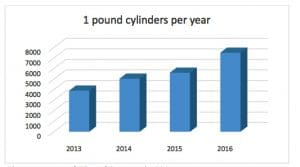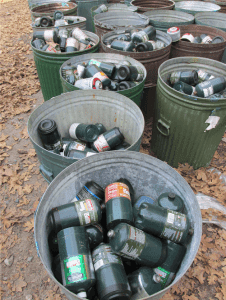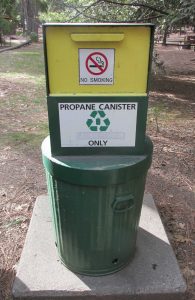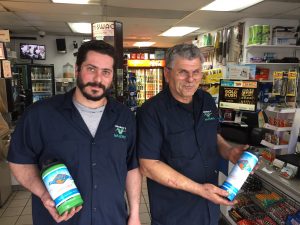The ReFuel Your Fun Campaign combats the problem of disposable 1-lb. propane cylinders and promotes the use of the new refillable cylinders instead.
Jordan Wells and Heidi Sanborn
In 2015, the Sunnyvale Materials Recovery and Transfer (SMaRT) Station, experienced an explosion and baler fire likely caused by a disposable propane gas cylinder. Adding fuel to the fire on cylinder management was the loss of 40 bales of cardboard worth $1,800. Another incident occurred in 2017 at this same location, demonstrating that this problem is far from extinguished. In fact, Figure 1, shows that the SMaRT station removed 7,500 1lb. propane cylinders off the lines in 2016— a 33 percent increase over 2015!

7,500 cylinders in 2016 (33 percent increase from previous year). Chart courtesy of City of Sunnyvale 2017.
Did you know that 40 million1 1 lb. propane gas cylinders are estimated to be sold in North America each year? Most people do not think about it but 1 lb. propane gas cylinders are widely used to power a variety of devices including camping stoves, portable heaters, lanterns, portable showers, tailgating grills, boat engines, scooters, lawn care equipment, insect foggers, and welding equipment to name a few. It is estimated that used cylinders occupy approximately 3.3 million cubic feet of landfill space annually2 and we know many are not being collected as hazardous waste. Instead, they are being put in everything from trash to recycling containers, which can be a safety issue for waste workers.
Cylinder Collection
So, what do people do with these “disposable” 1lb. propane cylinders? As a portable fuel, many cylinders are used outdoors, and once used are often left in the parks, campgrounds, tailgating venues, construction site trash, and even in agricultural water conveyances where farm workers cooked their meal on a grill while working. These cylinders are extremely expensive to manage properly as hazardous waste because they do contain a flammable fuel.

Yosemite National Park staff found so many cylinders in the trash they started a collection program to ensure they are managed as hazardous waste. Yosemite staff modified trashcans to collect the cylinders separately from trash and recycling. They collected 23,000 of the 1lb. propane gas cylinders in 2014 and the park spent over a dollar each to manage them. Costs to manage cylinders vary wildly with Lassen National Park in northern California spending $3.50 to manage a cylinder.
Cost of Disposal
Why is properly managing the cylinders so expensive? Because they must be punctured and emptied to safely transport and recycle. These costs compare to the purchase price of cylinders have a wide range averaging between $4.99 to $5.99. However, we have seen them as low as $3 and as high as $10. It is made of hot rolled steel, which has a huge green house gas (GHG) footprint according to U-Haul’s Chief Sustainability Scientist Allan Yang, Ph.D. and MBA. Dr. Yang calculated that 70 million pounds of GHG emissions could be prevented by adopting refillables in California alone over a 10-year product lifespan.

Image courtesy of Kamps Propane California.
The disposables are also expensive—we estimate 80 percent of the product price is the “disposable” packaging. When we are refilling 5-pound BBQ tanks, why wouldn’t the average user be willing to refill 1lb. tanks to save money and resources?
In California and other states where these gas cylinders are considered Household Hazardous Waste (HHW), they must be taken to an HHW facility for proper recycling. As a result, many cylinders are left behind at campgrounds, hidden in the trash or littered on the side of roadways, and are costing local governments and parks thousands of dollars to recycle. In Santa Clara County Parks System it cost $6 each to collect and transport the empty 1 lb. cylinders according to students at Santa Clara University who did a Senior Research Paper in 2017 on the issue. Then, these costs escalate as the County disposes of them for another $1 to 2 each, for a total cost of $7 to 8 to dispose of a cylinder that cost $4 to $6 to purchase.
In 2011, Manchester Tank was the first manufacturer to sell a refillable 1 lb. propane cylinder. In 2014, Flame King heated up the market and introduced a second version of the refillable. The two manufacturer’s cylinders hold the same amount of propane but differ slightly in the valve and have a different price point providing consumers two options to choose from.
“As an industry, we should and can do better” stated Sam Newman, CEO of Flame King in a recent article in Hearth and Home Magazine. “We wanted to offer a more environmentally responsible alternative but we knew it had to make economic sense for consumers, too.”
ReFuel Your Fun Campaign: Cooking with Gas
The ReFuel Your Fun Campaign was developed by the California Product Stewardship Council in partnership with local California governments in 2015 to combat this problem and promote the use of the new refillable 1 lb. propane cylinders. The local governments received grants from the California Resources Recycling and Recovery Agency (CalRecycle) which funded campaign materials. With refillables paying for themselves after only four uses and saving customers the hassle of proper disposal for 10 years, it did not take long for the Campaign to catch fire.
Kamps Propane, which has 11 retail locations in California, blazed the trail as the first propane supplier to sell and exchange refillables, branding them the Little Kamper. “We did this for our customers because they enjoy using 1lb. cylinders and this allows them to do it in an environmentally intelligent way,” said Josh Simpson, of Kamps Propane. Once Kamps started selling the refillables, they were helpful at showing it was a good business model, which led to even bigger retailers selling refillables.
“U-Haul rolled out its new one-pound refillable propane cylinder in California on June 2, 2016, and we have been thrilled with the public response. These environmentally friendly cylinders are now available at every U-Haul-owned facility that dispenses propane in California—a total of 126 stores. U-Haul will soon make this sustainable product available for purchase across the entire U.S. and Canada, both online and in its stores, while offering low-cost refills at its stores and many of its neighborhood dealer locations. U-Haul customers outside of California should be able to acquire the one-pound refillables sometime before camping season in 2018, and possibly by the end of 2017,” said Jeff Lockridge, Manager of Media and Public Relations, U-Haul International, Inc.
Today, there are 199 locations in California that sell refillable cylinders and 170 that refill or exchange them. Now the list is growing with smaller retailers and gas stations often providing the service. “It is a pleasure to see our customers save money and reduce waste by using the refillable 1 lb. cylinder, and we are happy to sell, refill and exchange refillables at our store!” said Kosta Sarakinis of George’s Fuel & Auto Repair in the City of Sunnyvale, CA.

Image courtesy of California Product Stewardship Council.
Thanks to the support of consumers and commitment of participating retailers, as of this writing there are now 590 retailers selling the refillables in 40 states across the nation, setting the stage for refillables to be the norm. The first non-propane national retailers are REI and West Marine selling empty refillables in stores across the country. While we want more retailers to sell refillables, it’s essential that trained and certified propane suppliers participate by also selling and refilling and/or exchanging the cylinders. The public wants to refill, but we need to greatly expand the refill locations nationally to make the paradigm change permanent.
Flame King Gives Back
Flame King’s innovation hasn’t stopped with the refillable 1 lb. propane cylinders. The company has opened the door on a new opportunity: large gas cylinder trade-in. Rather than paying for gas cylinders larger than 1 lb. to be hauled away for refurbishing, Flame King will arrange for the pickup of cylinders larger than 1lb. at no cost to the consumer. The company is hoping to then make a contribution to haulers, which then would be used to purchase refillables to offer customers when they bring in their disposables. Flame King will then refurbish the cylinders and put them back on the market to be used again.
Putting Out the Flame for Disposables
As the Refuel Your Fun Campaign momentum continues and word spreads like wildfire, more consumers and retailers want to know how they can buy refillables. That’s why we need your help! Here are simple steps you can do to promote the refillables:
- Promote refillables by linking to the website and social media at refuelyourfun.org
- Help recruit local retailers to sell and refill! Contact [email protected] for information on how and to add new retailers to our national map.
- Make sure your local governments that buy 1lb propane cylinders provide preferences or requirements in product specifications for refillables.
- Educate the public in your area on proper management for 1lb propane cylinders and tell them they can now use refillables.
We think the public will embrace the refillables and hope it helps our industry to save money and be more safe at the same time. Together we can put the flame out on disposables and together we can refuel our fun.
Jordan Wells is an Associate at the California Product Stewardship Council and the ReFuel Your Fun Campaign Manager. She can be reached at (916) 706-3420 or via e-mail at [email protected] .
Heidi Sanborn is the Executive Director for the National Stewardship Action Council, an affiliate of the California Product Stewardship Council, working to expand the Campaign nationwide. NSAC is eager to work with cities and counties across the country to bring refillables to their communities to reduce waste and support green businesses. She can be reached at (916) 402-3911 or via e-mail at [email protected].
For more information, visit www.refuelyourfun.org.
Notes
- Kamps Propane data estimate
- According to Hearth and Home Magazine Article “Off The Grid” by Lisa Readie Mayer, Jan. 2017
